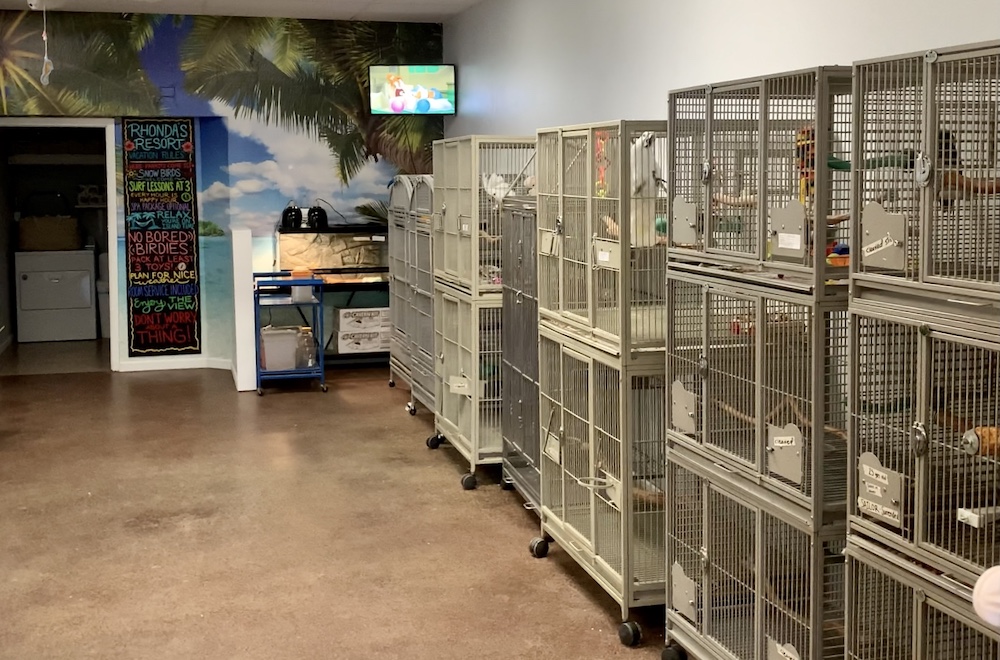WHEN WE STARTED offering bird boarding services at Rhonda’s Aviary, we did not have a dedicated location in the store. We used a room in the back. It was all we had to work with, but the customers didn’t seem to mind as it was clean and well lit, and we played music or kid’s movies for the birds all day. Once word got out that we offered boarding, we outgrew that room. It is not difficult to find a friend or relative to take care of your parakeet, but your blue and gold macaw is quite another story. We now board a LOT of large parrots.
In February 2020, we expanded our store. We used the expansion for a display room, plus a new boarding and grooming area. The boarding and grooming alone pay for the additional square footage. The boarding and grooming room is on the far side of our store. We like this for several reasons:
- There is entirely different air circulation to help reduce the possibility of introducing an illness to my birds or vice versa.
- If the large birds scream loudly, it does not disturb our customers’ shopping experience or our employees’ sanity.
- It has a completely different entryway and exit to reduce traffic flow through our store.
- We have an additional separate room for reptile boarding. This area has locked, escape-proof enclosures, and the door is kept shut at all times. This ensures the safety of both the small animals and birds we board, while not adding to their stress as birds are terrified of snakes. Reptiles should always have a separate room away from birds.

The boarding room at Rhonda’s Aviary.
More Factors to Consider Before Boarding Birds at Your Pet Business:
- You should have a complete and thorough contract. It should include information such as emergency vet care, what foods you will allow, your policy on abandoned pets, and any emergency plans or procedures for hurricanes, floods, fire, etc. Also note whether you require vaccines. At the time of this writing, there is only one vaccine available for birds: polyoma vaccine. Our contract specifies that we do not require it, so they understand the risk of not having their birds vaccinated. The contract should also clarify if there is any responsibility to you or your staff should anything happen to their bird. Our contract states that neither we, nor our families, or our landlord are liable if anything should happen while boarding with us.
- Each cage should have a tag that states the animal’s diet, whether or not they wish them to be groomed during their stay, and any special instructions from the owner.
- Each animal should have its own cubby where personal belongings are kept along with their current contract in case you need to contact the owner quickly in an emergency.
- You should have a checklist for the boarding room to ensure the animals are taken care of correctly and the room is kept tidy.
- You need to be specific about what you will allow and/or require. For example, our rules state that:
- They must bring three toys from home or buy three toys once at the store to help prevent boredom in their bird. We reserve the right to refuse any toy that we deem as unsafe. They will be in our care and our responsibility while staying with us. We do not want them to be hurt on a toy that we know is a potential hazard.
- They must bring food from home that is their animal/birds’ regular diet. Animals/birds stress easily, and changing their diet during a stay can add to their stress and bring on an illness.
- Their food must be appropriate for the species. We have a freezer and refrigerator available for any chop or pre-made diets and treats. We refuse to feed candy, dairy or meat products. Yes, we have had people bring candy, cheese, pizza pockets, lunch meat, hot dogs, canned soups and tuna for their birds. They are terrible for the bird’s health and can spoil rapidly. Fresh fruits, pulses and veggies, and birdie bread are encouraged.
- We reserve the right to refuse to board any animal/bird that does not look healthy or that is currently under the care of a veterinarian. We do not administer medication to anyone’s bird/animal.
- We do not board baby birds that are still hand feeding.
Advertisement
Our Boarding Fees to Use as a Guide:
We have a one-time cage rental fee of $15 if you use one of our cages. There is no extra charge if you bring your own store-approved cage from home. The cage must have outside feeder door access. This is to help prevent escapes and my employees from being injured while servicing the cage during feeding.
We charge by size:
- $7.95 – Extra small (canary, parakeet, parrotlet)
- $9.95 – Small (cockatiel, lovebird, quaker)
- $11.95 – Medium (amazon, African grey, pionus)
- $14.95 – Large (cockatoos, macaws)
I know we could charge more, but we want people to come into the store and buy products while they are there. Local vet offices charge more than twice what we do.